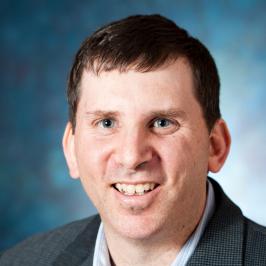Rabbis Donna Cephas, Sandra Lawson and Michael Hess Webber each took very different paths to becoming Reconstructionist rabbis. Despite disparate journeys, the three religious leaders have continuously demonstrated dedication, creativity and an ability to inspire others. Their stories share an additional element: their paths to the rabbinate were once blocked because their partners are not Jewish.
Every brick-and-mortar rabbinical seminary, including the Reconstructionist Rabbinical College, once had policies in place preventing the matriculation and graduation of students with non-Jewish partners. For example, it didn’t matter that Hess Webber had been a synagogue youth director, worked with Jewish teens with cognitive and physical disabilities, lived in Israel and managed a kibbutz fishpond. Her partner wasn’t Jewish, so she couldn’t become a rabbi.
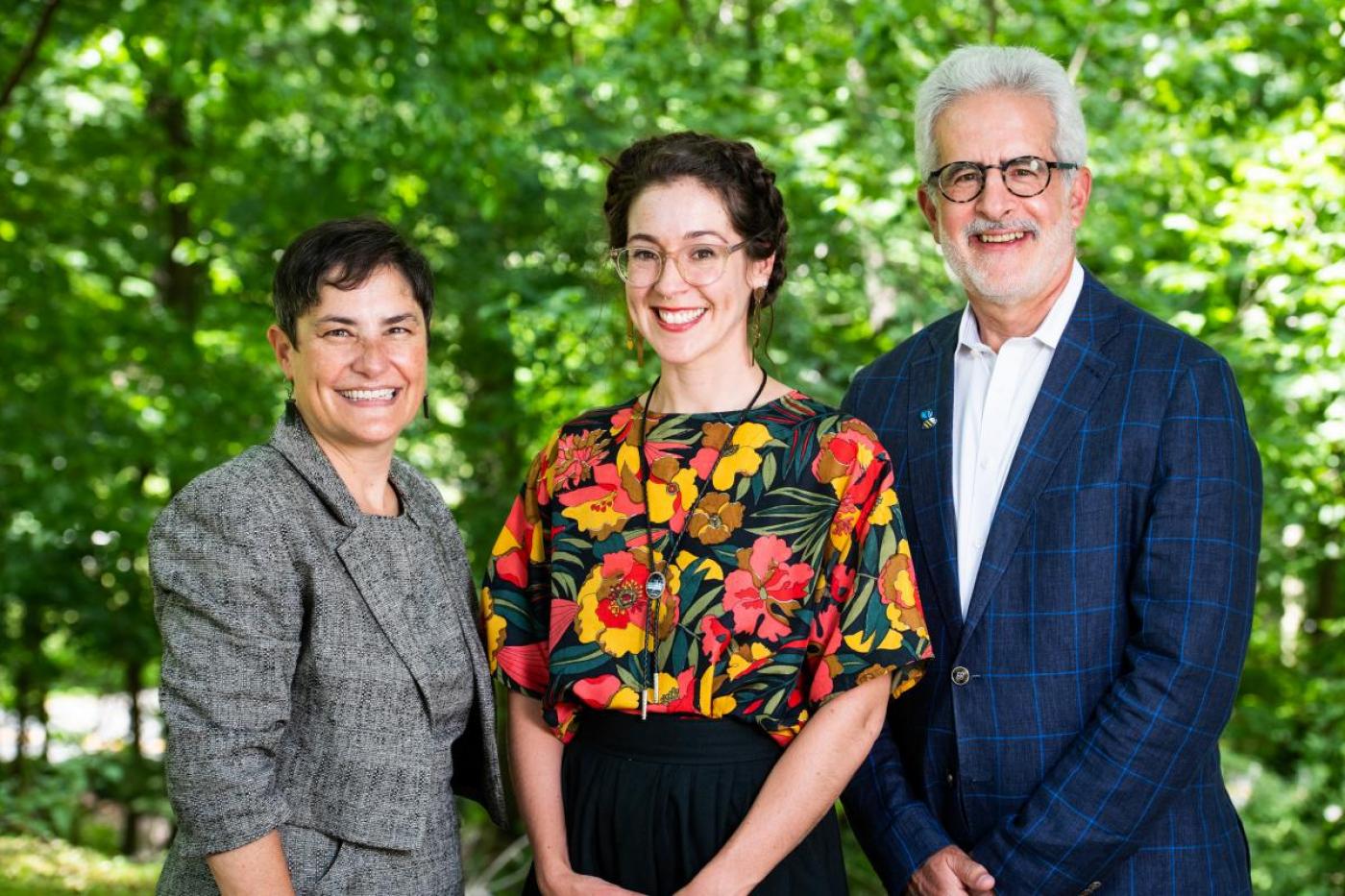
Rabbi Michael Hess Webber poses with Rabbi Deborah Waxman, president and CEO of Reconstructing Judaism and Seth Rosen, who chairs the organization’s Board of Governors, before RRC’s 2021 graduation ceremony.
Then, in September 2015, everything changed. The faculty of the Reconstructionist Rabbinical College (RRC) voted to make it the first — and, so far, only — major rabbinical seminary to admit and graduate rabbis with non-Jewish partners. (The Alliance for Jewish Renewal, which has long run a distance ordination program, has never barred students with non-Jewish spouses.)
“By making this decision to accept intermarried rabbis, the college did something difficult and controversial. It was the right decision, and it was the righteous decision,” said Hess Webber, who enrolled in 2016, graduated in 2021 and is now religious leader of Columbia Jewish Congregation, a Reconstructionist affiliate in Maryland.
At the time, what is known internally as RRC’s Partner Status Policy decision generated its fair share of headlines and controversy, both praise and criticism. Where proponents saw this as a matter of human rights akin to same-sex marriage and an outgrowth of Reconstructionist thought, critics raised questions about continuity and what it means for a rabbi to be an exemplar. Reflecting the intensity of the discussion, both views sometimes emerged from the same organization. Take, for example, The Forward, arguably the country’s leading source for Jewish news. Its then editor, Jane Eisner, penned a column, “Why We Should Not Accept Rabbis Who Marry Non-Jews” denouncing the move and arguing that, in this case, “inclusion leads to diminishment.” (She was especially worried because, she wrote, the Reconstructionist movement “has had an outsized effect on American Jewry, often embracing progressive stands years or decades before the more established denominations followed along.”) Shortly afterward, the same publication named Rabbi Deborah Waxman, Ph.D., president and CEO of Reconstructing Judaism, to its “Forward 50” list of most influential American Jews, proclaiming this decision a monumental victory for “those in the welcoming camp.”
Fast-forward six years, and Cephas, Lawson and Hess Webber have each graduated RRC and become respected rabbis. RRC student Adam Cerino Jones, who has a non-Jewish partner, is set to graduate in May and is exploring pulpit options. Though RRC doesn’t share exact figures out of privacy mandates, several students in classes behind Cerino Jones also have non-Jewish partners.
It can take decades to realize the full implications of a policy shift. While the first bat mitzvah was celebrated in the first Reconstructionist congregation in 1922, it wasn’t until the early 1950s that the movement fully committed to religious egalitarianism and started counting women in a minyan. So how best to assess the impact of this policy change on RRC, the movement and the broader Jewish world?
“I think we are going to look back at 2015 and the college’s decision to make this change as an incredibly important moment,” said Jodi Bromberg, CEO of 18Doors, a leading national Jewish organization working with interfaith families.
Bromberg herself is married to a Catholic woman, and together the couple is raising three Jewish children. The family also belongs to Kerem Shalom, an unaffiliated synagogue in Concord, Mass., led by Rabbi Darby Leigh, RRC ’08.
The Reconstructionist movement continues to be at the forefront of societal change in Jewish life
“The Reconstructionist movement continues to be at the forefront of societal change in Jewish life,” added Bromberg. “This is just another example of the Reconstructionist movement leading. There is no doubt in my mind that other progressive seminaries will get there. Everybody will look back and say, ‘Why didn’t we do this sooner?’ ”
The decision’s most immediate effect, said Bromberg, was clearing the way for qualified religious leaders to pursue their calling. Even more salient, she noted, is the statement made to interfaith couples and their children, who had never been fully embraced in Jewish communities.
“Being a rabbi is the pinnacle of Jewish community. And having rabbis who are married to spouses who aren’t Jewish says to so many, ‘your Jewish household is just as Jewish as anybody else’s,’ ” said Bromberg. “For children who grew up in a post-policy-change era, these kids will have a greater sense of self and greater connection to Jewish life and community. They know that the community doesn’t consider them ‘less than’ .”
Expanded Admissions Criteria
The 2015 Partner Status Policy vote emerged from a nexus of practical and values-driven concerns and followed a four-year process in which the input of faculty, students, rabbis, board members and members of affiliated communities were all considered.
In 2015, the faculty did more than reverse RRC’s Partner Status policy. At the time, RRC published an expanded and more rigorous set of admissions criteria, explicitly requiring students to have demonstrated a series of commitments, including engagement with God, Torah and the Jewish people. The criteria call upon prospective students to model commitment to Jewish continuity in personal, familial and communal life, and to engage in Jewish practice thoughtfully.
“We no longer want to prevent very wonderful and engaged Jewish leaders from becoming rabbis,” Waxman wrote in a 2015 email to supporters announcing the new policy. “After years of study, research and discussion with many members of the Reconstructionist community, we have concluded that the status of a rabbinical student’s partner is not a reliable measure of the student’s commitment to Judaism — or lack thereof. Nor does it undermine their passion for creating meaningful Judaism and bringing us closer to a just world. The issue of Jews intermarrying is no longer something we want to fight or police; we want to welcome Jews and the people who love us to join us in the very difficult project of bringing meaning, justice and hope into our world.”
More recently, Waxman has spoken about moving beyond a language of welcoming, which could be interpreted as the mainstream tolerating the marginalized. “We have to be willing to be transformed and celebrate that what comes next looks different,” she said in a recent interview.
Faculty also considered the set of challenges many rabbis face in finding supportive partners, as well as challenges faced by the partners themselves — ranging from committing to life with extremely busy individuals, to expectations that the partner plays a supporting role in building up Jewish community, and, if that partner happens not to be Jewish, implicit or explicit pressure to convert to Judaism.
Perhaps most profoundly, the 2015 policy change emerged from the increasingly complex ways Reconstructionists understand what it means to belong to a contemporary and diversifying Jewish community, an understanding that makes room for non-Jewish family members and embraces terms like “Jewish-adjacent,” “fellow travelers” or “Jews and the people who love us.”
“This binary notion, whether you are Jewish or you are not — this assumption that there is an all-in or all-out — is a way of thinking that doesn’t account for so much of people’s lives and experiences,” said Amanda Beckenstein Mbuvi, Ph.D., a Bible scholar and Reconstructing Judaism’s vice president for Academic Affairs. “One of the things that we need to do is to shift our imagination to new ways of thinking about being the Jewish people.”
Several graduates said in interviews that it is difficult to overestimate the hurt and anxiety caused by the prior policy, especially for students who began relationships with non-Jews while in rabbinical school, placing pressure on non-Jewish partners to convert. Some experienced a fear of discovery. Many LGTBQ students and, more recently, students of color, whose efforts at dating within the Jewish community could be fraught, found the policy particularly problematic.
For example, Rabbi Maurice Harris, RRC ’03, had just been accepted to RRC and had deferred for a year when he met and started seeing Melissa Crabbe; both were living in the Bay Area. Crabbe had been raised in a conservative Christian household in Japan. As they grew closer, and Harris’ departure approached, he reluctantly told her about RRCs policy.
“I was horrified. This just seemed completely and manifestly counter to Reconstructionist values,” said Crabbe, who at the time was attending classes on Judaism and reading works by Reconstructionism’s founder, Rabbi Mordecai Kaplan.
The couple was married after Harris finished his first year; his future as a rabbi remained very much in doubt. Crabbe was a vital presence in the RRC community. The couple joined an informal group that lobbied publicly for a policy change. Still, at many points, Harris considered dropping out of rabbinical school, rather than pressure his wife to undergo a conversion.
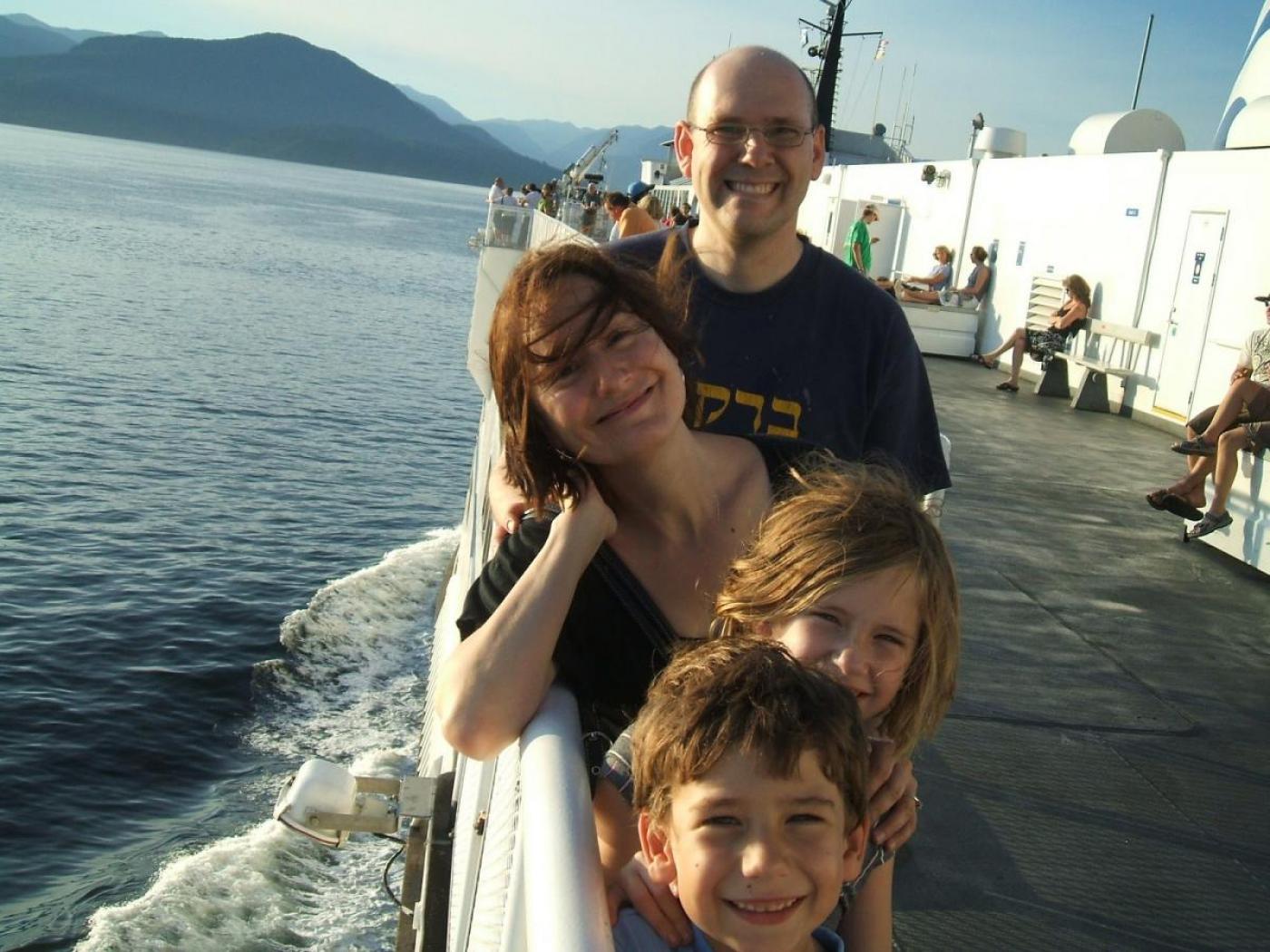
Rabbi Maurice Harris and Melissa Crabbe shortly after adopting their two children, Clarice and Hunter.
“What was going to happen for my whole adult life if my wife resented this thing that she was willing to do?” he said. “My marriage was more important to me than being a rabbi.”
Crabbe decided that she was fully invested in Reconstructionist Judaism and wanted to formalize her commitment; though she wished it were under different circumstances, and the occasion of her conversion was not an altogether joyous one.
Still, as Harris graduated and then served as assistant rabbi and education director at Temple Beth Israel, a Reconstructionist affiliate in Eugene, Ore., Crabbe’s love of Jewish life only grew, and she didn’t regret her decision. When the policy was changed, more than a decade after Harris’ graduation, “We just felt like ‘we knew it, we knew it would happen eventually,” said Crabbe.
The change was a big part of the reason they were enthusiastic about moving back to Philadelphia for Harris to join Reconstructing Judaism as associate director of Thriving Communities and Israel Affairs Specialist.
Rabbis in the Field
Without extensive opinion polls, it’s difficult to gauge communal attitudes regarding rabbis with non-Jewish partners and the extent that they may have changed since 2015. Several rabbis interviewed for this story note feeling more comfortable speaking about their relationships and feels accepted by colleagues and in many Reconstructionist communities. More than one rabbi interviewed believes they didn’t get a job because they were married to a non-Jew. Others noted that there are still Jewish settings in which their partner feels uncomfortable.
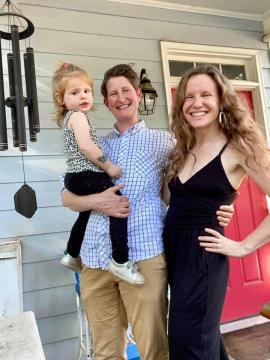
Rabbi Malka Packer-Monroe with her partner, Mercy Packer-Monroe, M.Div, and their daughter, Luna.
To be sure, rabbis long graduated from RRC or other seminaries have married non-Jewish partners, though exact numbers are unknown. Rabbi Elyse Wechterman, executive director of the Reconstructionist Rabbinical Association, noted that the association does not ask its members about their partners’ religious status.
Rabbi Malka Packer-Monroe, RRC ’14, married Mercy Packer-Monroe, an ordained minister in the United Church of Christ, four years ago.
The relationship has been abiding and deeply oriented toward Judaism. Together, the two have built a Jewish home in Atlanta, raising their daughter, Luna. Malka Packer-Monroe noted that Mercy has fasted on Yom Kippur and plays an active role in Jewish observance, yet remains firmly committed to her Christian faith and traditions. “I have dated many Jews who don’t feel comfortable talking about God and spirituality. My partner knows more about Judaism than many members of my Jewish family.”
When I work with an interfaith couple, I can literally say to them, ‘I truly understand where you are coming from. My spouse and I have had these deep and meaningful conversations ourselves.’
At times, she noted, being married to a partner who does not identify as Jewish has felt like a career obstacle.
It wasn’t until she joined the staff at 18Doors, a group that specifically works with interfaith families, that she truly felt celebrated as a rabbi. There, she leads workshops specifically for interfaith couples, teaches classes, offers pastoral counseling, and officiates weddings and baby-naming ceremonies.
“When I work with an interfaith couple, I can literally say to them, ‘I truly understand where you are coming from. My spouse and I have had these deep and meaningful conversations ourselves.’ I can see people just relax. ‘You are not just a rabbi who is tolerant and nice and cool. You get it. You are living it. It makes a huge difference.”
Samantha Portnoy, a school social worker living outside Charlotte, N.C., is among those whose lives have been touched by Packer-Monroe.
The native of Decatur, Ga., had fallen in love with Gabriel Rogers, who was raised in the Catholic Church. It was important to Portnoy to find a rabbi in the Atlanta area who was not only willing to perform a ceremony for an interfaith couple but who would embrace some other non-traditional elements, such as her choice to have bridesmen rather than bridesmaids. At the same time, Portnoy, who grew up in a tight-knit Jewish family and had envisioned herself marrying a Jewish man, was grappling with feelings of guilt, as if somehow she was letting the Jewish people down with her choice of a life partner. Talking with Packer-Monroe not only helped Portnoy address her own misgivings, but opened the door for her partner to learn about Judaism and discuss the role it might play in their lives.
“Her direction was so meaningful. I started getting into learning about Judaism. Now, it is a big part of my identity. Malka was there for a lot of it,” said Portnoy, who in 2020 married Rogers in a Zoom ceremony conducted by Packer-Monroe, who adapted the traditional seven blessings, borrowing themes from Portnoy’s beloved book, The Amber Spyglass by Philip Pullman. “I appreciated that she understood where I was coming from, the importance of representation of my religion and culture, and also honoring where Gabe is in his life.”
The couple attended nearly every virtual workshop and class Packer-Monroe offered. Rogers, though having no plans to convert, has taken an active role in Portnoy’s exploration of Judaism by reciting Shabbat prayers and attending a virtual Yom Kippur service. Judaism has become such an important part of Portnoy’s life now that she’s even considering the rabbinate.
Get The Latest Reconstructionist News & Articles
Bringing About Change
At RRC, some of the people most deeply involved in bringing about the policy change had a personal stake in the issue, including Rabbi Shelley Goldman, RRC ’16.
The Chicago native arrived at RRC in 2010 with a background in community organizing, specifically in working with LGBTQ teens in New York City. Goldman was unpartnered when she applied to the college, recalling that she was nevertheless surprised when she first learned of the policy. Then, in the middle of her first year, Goldman met Kieran Kiley, the person whom Goldman would later marry, and what had been a moral and philosophical stance now had personal meaning.
“I love being Jewish. I didn’t want Kieran to have to convert for me. I wanted her to become Jewish because she wanted to become Jewish,” said Goldman, who has served congregations in Indianapolis, Pittsburgh and suburban Philadelphia.
When Goldman learned that RRC’s faculty was reopening discussions of the Partner Status Policy, she put her organizing skills into action — creating a college-wide program addressing the issue, meeting with every faculty member and facilitating conversations with more than 50 students. She learned that the overwhelming majority of students opposed the ban on ordaining intermarried rabbis. (At the time, the feeling among graduates and members of congregations was decidedly more mixed.)
“I wanted to prove to the faculty that not only did I care about this, but so did almost every other student,” said Goldman. “It was exerting pressure. It was a way of saying, ‘This is what we think, and we want this to change.’”
After Goldman and Kiley were married in a Jewish ceremony, it looked as if Goldman might become the first student to graduate with a non-Jewish partner. But things didn’t turn out that way.
“When the policy was removed, Kieran joyfully converted. She didn’t want anyone else to tell her what to do. Because Kieran happily became a member of the Jewish people, I am not living the experience of being a rabbi with a non-Jewish partner,” recalled Goldman.
As a religious leader who performs interfaith weddings, conversion ceremonies and interacts with modern Jewish families, Goldman believes that “it is an asset and a benefit that I have been through the process of showing my partner what a meaningful Jewish life can be, of having had those conversations with her.”
Rabbi Sandra Lawson, RRC ’18, who was the first rabbi partnered with a non-Jew to graduate under the new policy, was among those galvanized by Goldman’s activism. As someone who had experienced both racism and homophobia in the Jewish community, she found dating as clergy-in-training quite fraught. Lawson also believed that there were unmistakable racial connotations to the notion of an institution policing who its students can and cannot marry.
“I had decided I was not going to share my personal, private dating life with anybody at RRC. I had this very hard line that kept me closed off,” recalled Lawson, adding that it was after Goldman had organized a community program on the subject that her attitude changed.
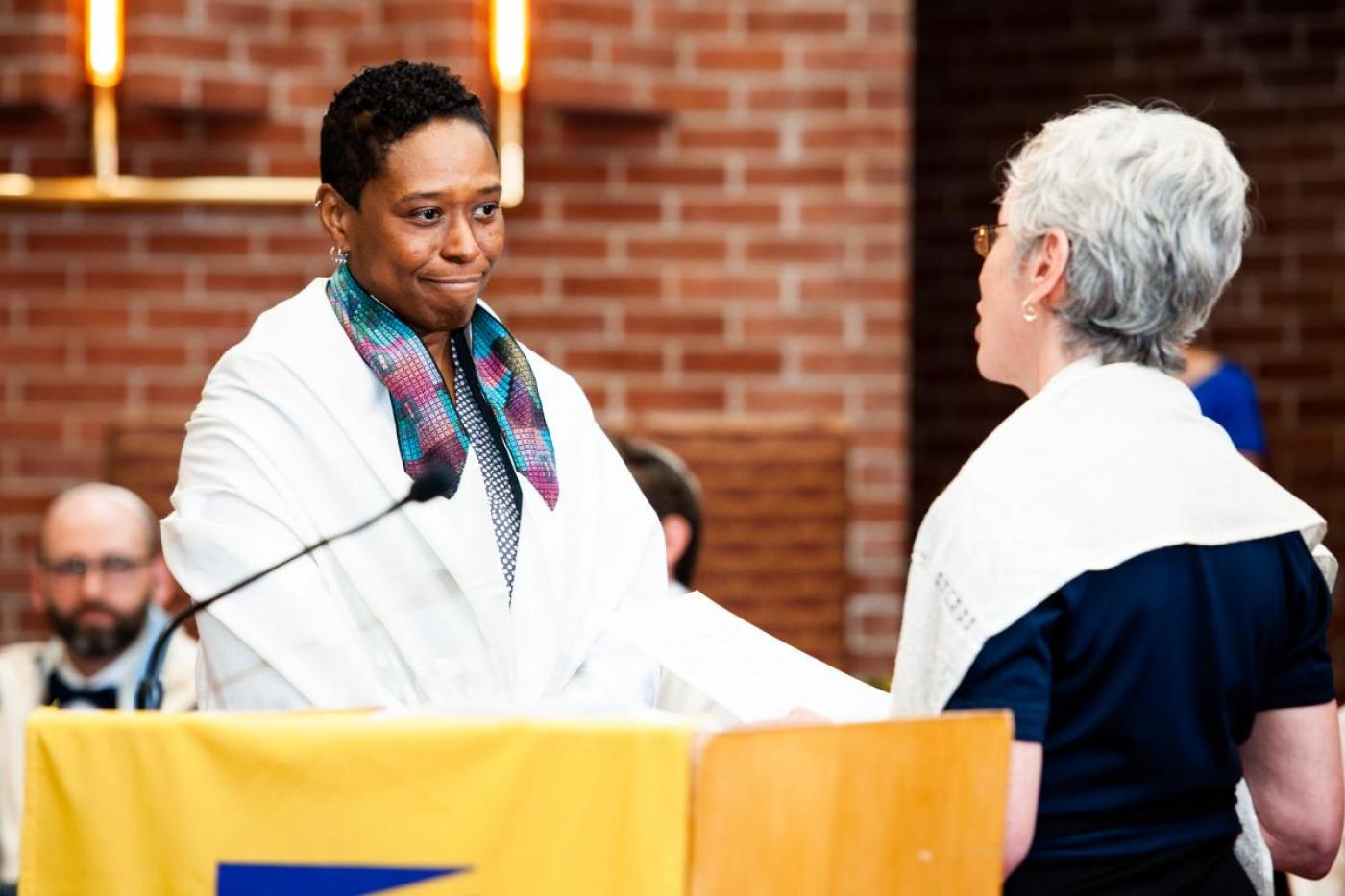
At RRC’s 2018 graduation, Rabbi Sandra Lawson received a blessing from Elsie Stern, then vice president for academic affairs.
Speaking out against the old policy helped Lawson become more fully herself as a religious leader and enabled her to let go of some of the hurt that had been caused by RRC’s former stance.
“I told Shelley [Goldman]: OK, ‘I feel better now.’ This helped me heal. What can I do to help? I started conversations with the faculty,” said Lawson, who in 2021 became Reconstructing Judaism’s inaugural director of racial diversity, equity and inclusion. “We were so ready for this policy change that by the time it happened, it was almost a non-issue, at least at RRC.”
With an ever-growing social media imprint and laser focus on addressing racism, Lawson was named to the “Forward 50” list of America’s most influential Jews in 2020. In her previous role as associate chaplain for Jewish Life at Elon University in North Carolina, Lawson connected with hundreds of Jewish and non-Jewish students, often with her wife, Susan Hurrey, at her side.
The things we do, even though we may be highly criticized for them at the time, show where the Jews are going.
As a self-described unicorn — a Black and queer rabbi — she most easily connects with Jews who, in one way or another, have felt marginalized in Jewish communities. Mackenzie Martinez, a recent Elon graduate, credits Lawson with helping to guide her own Jewish journey. Martinez identifies as a Jew of Color. Her Mexican American father is not Jewish, while her mother is white and Jewish.
“I never had a Jewish figure in my life who had a similar identity as me,” said Martinez, who met Lawson as a student at Elon, and today is combining her love of Judaism and commitment to social justice by participating in the Avodah Fellowship in San Diego, which enables people to pursue social justice in a Jewish context. “Sandra is a treasured mentor. Sandra is so warm. Always willing to lend an ear. We’ve had lots of talks about finding your own version of Judaism.”
RRC graduates outside the mainstream, including those with non-Jewish partners, have been introducing the concept of Reconstructionist Judaism to a wider range or people.
“We are at where the Jews are going,” said Lawson. “The things we do, even though we may be highly criticized for them at the time, show where the Jews are going. The things that made the movement so radical in the mid-20th century are so normal now. If you want to see where the Jewish community is going, look at us,” said Lawson.
Reconstructionist Values
Cephas, a longtime Jewish educator and activist, belonged to a Reform congregation for decades and earned a master’s in education at the Jewish Theological Seminary, the Conservative movement’s flagship seminary. In 1991, she married Derrick Cephas, a non-Jewish financial-services lawyer with a strong commitment to social justice. The couple raised their two children as Jews, kept a Jewish home, and were active in several Jewish communities and numerous causes.
Once she learned that she could apply to RRC, she got her hands on a copy of Exploring Judaism: A Reconstructionist Approach, an accessible introduction to Reconstructionist Judaism by Rabbi Rebecca Alpert, Ph.D., and Rabbi Jacob Staub, Ph.D.
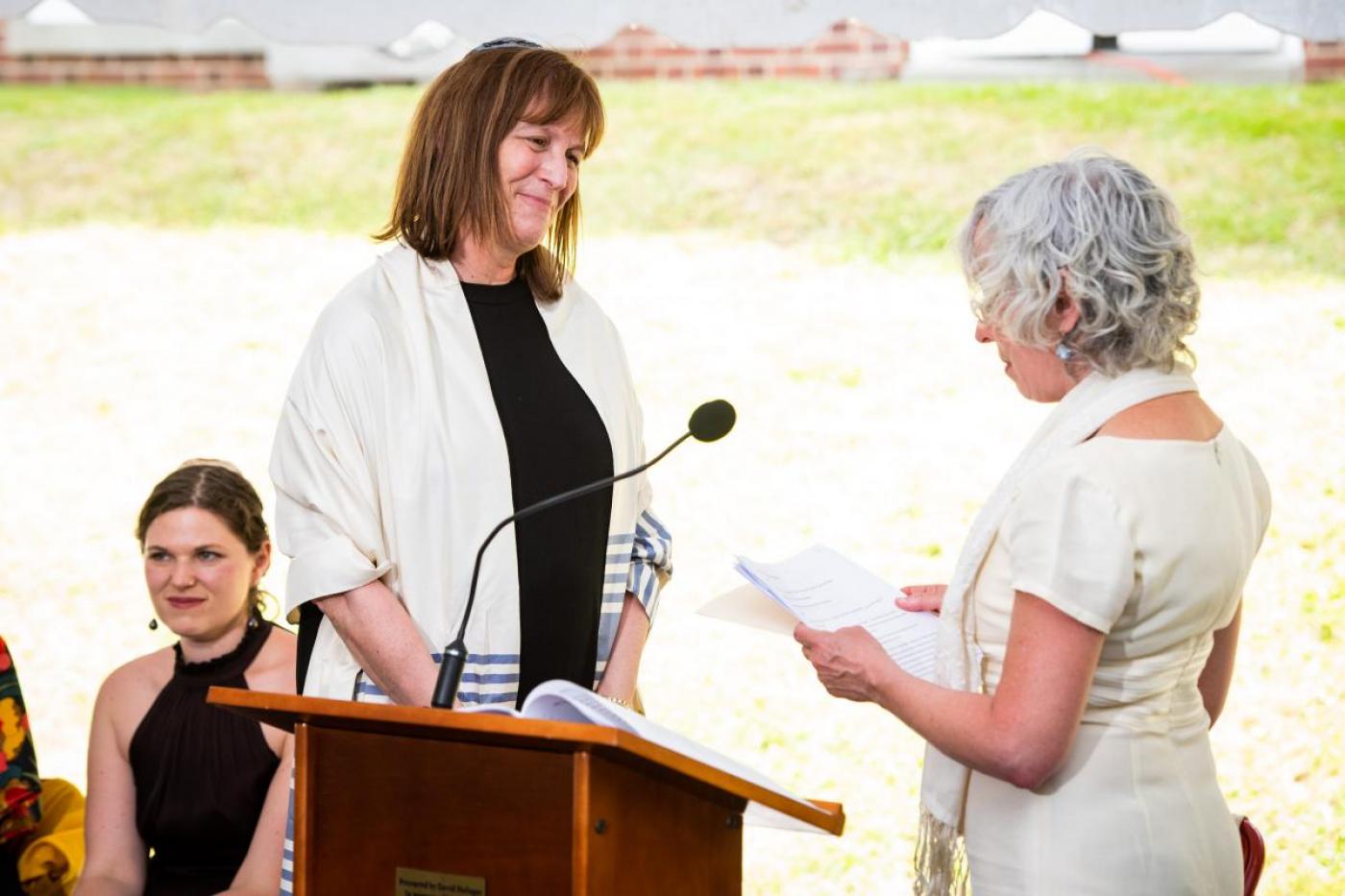
Rabbi Donna Cephas with Elsie Stern at RRCs’ 2021 graduation.
“As I was reading, these lightbulbs were going off in my head,” recalled Cephas, who since graduating has focused on the Voices of Jerusalem Narrative Project, an initiative she helped start that seeks to build greater understanding and engagement by sharing the life stories of Jewish, Christian and Muslim women living in Jerusalem. (Voices of Jerusalem Narrative Project has received funding from Reconstructing Judaism’s Auerbach Entrepreneurial Grant Program.)
“I thought, ‘This is my sense of Jewishness. This is my place to develop and learn as a Jew, and hopefully, enable others to do the same,’ ” said Cephas, RRC ’21. “In the vein of our Talmudic tradition, if you enable one person to flourish, you enable a world to flourish.”
Adam Cerino Jones grew up in a secular Jewish home in Baltimore. His mother was Jewish; his father wasn’t. The family didn’t belong to a synagogue. He often questioned whether he truly belonged in any Jewish community. That changed during his years at Macalester College in St. Paul, Minn., where his experiences with Jewish life on campus set him on a very different path.
He considers the new Partner Status Policy “an important statement of values about inclusivity.”
“This was a statement that rabbis partnered with non-Jews can make excellent religious leaders. This was also a clear way of saying that the children of intermarriage count as much as children with two Jewish parents,” he said.
When he first applied to rabbinical school in 2015, Jones hadn’t yet met Katherine, the woman who would be become his wife. She grew up in a religious movement known as Charismatic Catholicism.
Jones noted that Katherine has a master’s degree in religion in antiquity, knows the Hebrew Bible as well (or better) than he, and reads Hebrew fluently. It’s possible, he said, that one day, she’ll choose to become a Jew.
“I really don’t ever want her to feel like she must convert. It is such a big decision. I staunchly oppose people making that decision under coercion. I’m proud to be part of a movement that allows people to be who they are.”
Special acknowledgments to Tresa Grauer, Ph.D., Rabbi Melissa Heller and Rabbi Joshua Lesser for offering valuable perspectives for this piece.
Additional Links:
Rabbis Sandra Lawson and Donna Cephas: Race in the Jewish Community, Evolve

